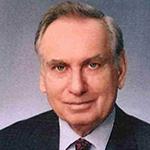Why did you choose to study at the Graduate Institute?
After receiving my B.A. in International Relations from the University of California, Berkeley in 1950, I decided to continue my studies in Europe.
As French was still considered the language of diplomacy at the time, I decided that my choice would be either the Ecole de Sciences Po in Paris or the Graduate Institute in Geneva.
But Geneva had a special attraction for me because both lectures and exams were conducted in several languages, including English. So, in 1950 I landed at the beautiful villa facing the lake surrounded by a magnificent park where the Institute was located at the time.
What was your impression of the Institute when you arrived?
I found the atmosphere very different from my American university experience. Very soon after I began, I met Professor William Rappard, the Institute's founder, Switzerland's most prominent diplomat at the time and a close personal friend of Chaim Weizmann – former head of the World Zionist Organization and by then, the first President of the State of Israel.
The Institute counted among its faculty some of the great luminaries in the fields of political history, international law and economics, including Paul Mantoux, who was also a co-founder, Maurice Bourquin, former senior Belgian diplomat, William Roepke, who was a guiding light internationally in liberal economics, and Professor Paul Guggenheim.
The general spirit at the Institute was one of political and economic freedom, and internationalism and opposition to authoritarianism whether right or left.
Lectures and seminars were very different from what I had experienced at Berkeley, focusing more on round table discussions (although the table was actually oblong), and students' position papers served as a basis for further discussion.
In addition to the subjects we studied, the multinational composition of both faculty and the student body naturally contributed to the cosmopolitan and multicultural atmosphere at the Institute, as well as guest lecturers. I even remember Nobel Peace Prize winner Norman Angell attending class as a temporary student.
What did you take away from your time as a student?
At the time, Geneva was just as international as today and although it was still a bit provincial, those aspects contributed to the Institute’s special atmosphere.
The fact that the Institute gave me the opportunity to learn from such extraordinary scholars and in the company of fellow students from different corners of the globe certainly sparked my career in politics, diplomacy and finance.



